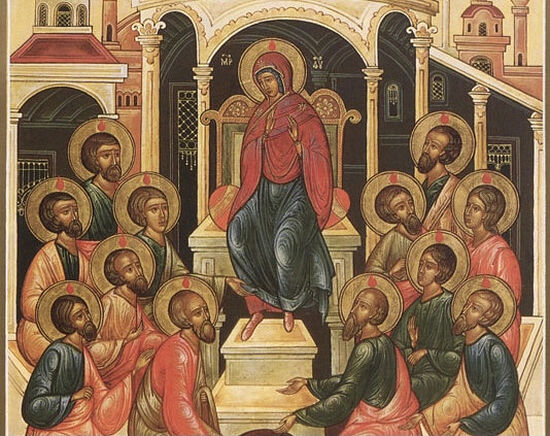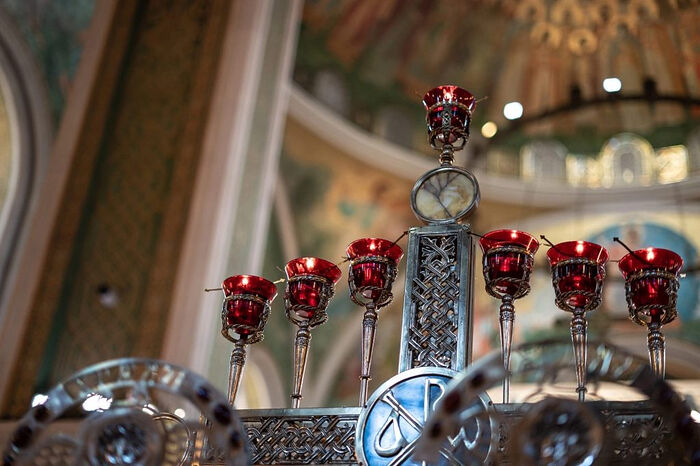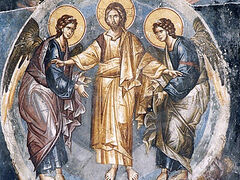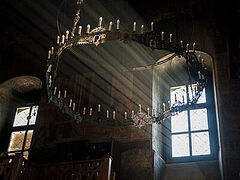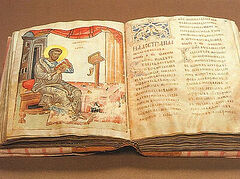We continue our talks on the Book of Acts with Sergei Komarov, a well-known catechist based in Moscow.
2:1 And when the day of Pentecost was fully come, they were all with one accord in one place.
If we recall that there are no chapter divisions in the ancient texts, but the text simply continues, then in context, “they all” means the 120 disciples. All our commentators unanimously say that the Holy Spirit descended upon the entire Christian community. This is important, because if we accepted the idea that the Holy Spirit descended only upon the Apostles, that would mean the Church has come form of privileged caste that has and distributes the Holy Spirit. But the receptacle of all the gifts of the Holy Spirit is the Church. The Holy Spirit lives in the Church—it’s just that the Church was so small then—just 120 people.
And the Church appoints this or that person to some kind of ministry: bishop, presbyter, deacon, or a simple layman—but we’re all baptized and chrismated. We’re chrismated by the Holy Spirit, and we’re all servants of Christ. It’s just that everyone has their obedience, their status in the Church. But the receptacle of the Holy Spirit, through which the Holy Spirit acts, is the entire Church.
The question has arisen many times in the history of the Church: “Who is the Church?” Different opinions have been expressed. For example, that the Church is the hierarchs or only the people. But in the Epistle of the Eastern Patriarchs, it says that the Church is all the people of God—both the clerics and the laity together are the Church, it’s just that every person has their obedience before God.
And here they were all with one accord when Pentecost came. The Jewish Pentecost was the day of the granting of the Law to the Jews. Pentecost is also the fiftieth day after the Jews left Egypt, the fiftieth day after Passover. The day of unleavened bread was celebrated on Passover, so Passover is sometimes called the Feast of Unleavened Bread. Unleavened bread is lenten bread that was baked on this feast, when they brought the first ears of the harvest to God. There was a symbolic rite during which the priest waved a sheaf “before the face of God.” These were the first fruits. So on Pentecost they thanked God for the harvest, on the fiftieth day after the first fruits were offered.
So, Pentecost is thanksgiving to God for the first harvest. It’s the first because in the east the harvest is gathered twice.
A few words about unleavened bread. Leaven in the Old Testament was a symbol of sin and Egyptian vices, so leaven wasn’t sacrificed to God. Unleavened bread was a symbol of purity and holiness. And in the New Testament, the Apostle Paul uses the same meanings: Your glorying is not good. Know ye not that a little leaven leaveneth the whole lump? Purge out therefore the old leaven, that ye may be a new lump, as ye are unleavened. For even Christ our passover is sacrificed for us: Therefore let us keep the feast, not with old leaven, neither with the leaven of malice and wickedness; but with the unleavened bread of sincerity and truth (1 Cor. 5:6-8).
But we serve the Liturgy with leavened bread, because we take the symbolism from Christ’s parable about the woman who kneaded three measures of flour with leaven until the whole lump is leavened: Another parable spake He unto them; The Kingdom of Heaven is like unto leaven, which a woman took, and hid in three measures of meal, till the whole was leavened (Mt. 13:33). And, using the meanings from this parable, we understand the Kingdom of God as something growing, leavening in a man, rising, like dough. Therefore, we serve the Liturgy with leavened, risen bread. It’s a kind of symbol of the Kingdom of God that gradually grows inside man. This symbolism of living growth, of gradual leavening is important for us.
Catholics have taken the Old Testament meaning and serve on unleavened bread, which symbolizes purity and holiness in the Old Testament (although, the Apostle Paul also writes about this in the New Testament). Additionally, there’s the view that since Christ celebrated Passover the day before (those who came from afar were allowed to celebrate Passover a day early), then He celebrated Passover with unleavened bread. There was a rule that there should be no leavened bread in the house at all—you couldn’t even look at it. But another point of view says that since Christ celebrated Passover a day early, then He still could have used leavened bread.
Sometimes the Greek word “άρτος (artos),” which is used in the Gospel, is cited as confirmation that Christ used leavened bread. But at that time, in the first century, the word “artos” could mean bread in general, whether leavened or unleavened. Because of this, brutal disputes arose with Western Christianity. In general, the disputes with Western Christianity have a dogmatic and liturgical character. The dogmatic is much more important than the liturgical. This topic belongs to the liturgical disputes.
But let’s return to the spiritual meaning of Pentecost. The Holy Spirit descended precisely on the Jewish feast of Pentecost—why? The Jews celebrated Pentecost as the day of the giving of the Law, but Christ not only fulfilled the Law, but filled it with new content. In the Sermon on the Mount, Christ speaks about two Old Testament commandments: Thou shalt not kill and Thou shalt not commit adultery. That is, Christ translates the Old Testament commandments from external to internal life, bringing the commandments into the heart of man. The Christian understanding of the commandments is internal, spiritual, and their fulfillment is also internal, not only external.
The Law was given on the day of the Jewish Pentecost, and in order to fulfill the essence of the Law spiritually, in a Christian manner, the grace of the Holy Spirit was necessary. Man himself couldn’t do it. Therefore, God gives the Spirit on the day of the Jewish Pentecost. “Consider the image and know the truth,” St. John Chrysostom says about it. The image turns into Truth; that is, the Law becomes fulfilled, and God gives spiritual strength and grace to fulfill the Law in the spiritual, Christian sense.
Thus, we can draw a parallel between Moses giving the Law and God the Father giving the Holy Spirit by the intercession of God the Son.
2:2 And suddenly there came a sound from Heaven as of a rushing mighty wind, and it filled all the house where they were sitting.
Wind often appears in the Holy Scriptures as a symbol of the Holy Spirit and a sign of God breaking into history. The house is a symbol of the world, the universe, and a symbol of the Church and the whole economy of our salvation.
2:3 And there appeared unto them cloven tongues like as of fire…
St. John the Forerunner said about Christ: He shall baptize you with the Holy Spirit, and with fire (Mt. 3:11). And Every one shall be salted with fire (Mk. 9:49), Christ foretold to the Disciples. Now the time has come for the fulfillment of prophecies. We can compare these tongues of fire with the fire that appeared on Mt. Sinai, when God gave the Law to the Jews (cf. Ex. 19:18).
… and it sat upon each of them.
It’s interesting that people gather together in the church, but the Spirit descends on everyone individually. The era of personal communion with God is beginning.
In ancient Israel, the people of God communicated with God through priests, prophets, or kings. The religious consciousness was collective, conciliar. Man was united in a society that God led and communicated with. Christianity gives a new, personal religious consciousness. The Church is a gathering of people—not a crowd, but a gathering of people. We communicate with Christ all together and everyone individually. The Church combines within itself a healthy collectivism and a personal beginning.
Each of us knows Christ somehow in a way that others don’t know Him. Everyone has their own conversation with God, but we all gather in church and pray to God together. A man must know Christ in a “Churchly” manner, if we can say that, and he must know Christ “personally.” It doesn’t mean there are two Christs. He is one, but Christ in the Church, as a liturgical assembly, is revealed in a certain way, and Christ is revealed to every man in the personal experience of communion with God.
A Christian hears the quiet voice of the Lord, Who speaks to him through the circumstances of life, through the Gospel. And these two dimensions—ecclesiastical and personal—mustn’t be lost. If you lose one of them, it means the distortion of the Christian life. For example, when a man goes to church for twenty years but doesn’t talk to God within himself. Conversely, when a man has some kind of personal relationship with God, but he doesn’t know the Churchly dimension of Christ, it’s not interesting to him. I am come to send fire on the earth (Lk. 12:49), says Christ. Christianity is fire. Christianity is Quench not the Spirit (1 Thess. 5:19). We have to have zeal for God, to be active, to think about the spiritual life, to long for Christ. If sin comes into our lives, it should be a real tragedy. We need a living relationship with God.
The Jews associated the outpouring of the Spirit with the end of time. And the signs that God gave on the day of Pentecost show that the “last times” have begun, that is, the final spiritual epoch of the life of the world has begun—the time of the Church, the era of the New Testament. And the Kingdom of the Messiah, Whose arrival the aforementioned signs were connected with, has already begun its action—in His Church.
2:4 And they were all filled with the Holy Spirit, and began to speak with other tongues, as the Spirit gave them utterance.
The first action of the Holy Spirit was that the Apostles began to speak in other tongues. The Church is born as an organism that speaks about God. The Church is born preaching. The first minutes of the Church’s life is a sermon. The Apostles began to preach immediately after the descent of the Holy Spirit.
The Church is born as a speaking Church—and that’s obviously how it’s supposed to be. And the Church is us. We are Christ’s mouth, His eyes, His hands. He acts in the world through us. And in particular, the preaching of the Gospel must sound forth through us. Without preaching, there is no Church.
The first action of the Holy Spirit in the Apostles is missionary work. We read in Scripture that the fruits of the Holy Spirit are love, joy, peace, longsuffering, gentleness, goodness, faith, meekness, and temperance. Whoever has these qualities has acquired the fruits of the Holy Spirit. The Holy Spirit responds in the soul with peace, purity, repentance, and a sense of the presence of God. But here we also have the action of the Holy Spirit—preaching, the desire to share the joy of Christianity, to tell others.
2:5 And there were dwelling at Jerusalem Jews, devout men, out of every nation under Heaven.
2:6 Now when this was noised abroad, the multitude came together, and were confounded, because that every man heard them speak in his own language.
2:7 And they were all amazed and marvelled, saying one to another, Behold, are not all these which speak Galilaeans?
2:8 And how hear we every man in our own tongue, wherein we were born?
2:9 Parthians, and Medes, and Elamites, and the dwellers in Mesopotamia, and in Judaea, and Cappadocia, in Pontus, and Asia,
2:10 Phrygia, and Pamphylia, in Egypt, and in the parts of Libya about Cyrene, and strangers of Rome, Jews and proselytes,
2:11 Cretes and Arabians, we do hear them speak in our tongues the wonderful works of God.
2:12 And they were all amazed, and were in doubt, saying one to another, What meaneth this?
2:13 Others mocking said, These men are full of new wine.
What is this gift of speaking in tongues? If we look at the Sacred Scripture of the New Testament, we’ll see there are at least three facets to speaking in tongues, three actions of this gift.
The first type of speaking in tongues is the knowledge of foreign languages without prior study. In the first century, for the Twelve Apostles and the few people of like mind to go around the whole world preaching, they had to resolve the problem of language. The Apostles had no time to sit down and study Greek, Latin, Syrian, Egyptian, and the Slavic languages. They would have wasted their whole lives on it. Therefore, God gave them such a missionary gift—the knowledge of foreign languages. But then the Lord took this gift away, because now it’s pleasing to God for missionaries to labor, to learn foreign languages, to study the culture of the country they’re preaching in.
All the great missionaries studied foreign languages—they no longer had the Apostolic gift. It’s normal that God takes away some gifts and gives others. God gives every era what it needs. And every gift corresponds to some kind of ministry in the Church.
The second type of speaking in tongues is a kind of angelic language for personal prayer contact with God. The Apostle Paul describes this in his first Epistle to the Corinthians: For he that speaketh in an unknown tongue speaketh not unto men, but unto God: for no man understandeth him; howbeit in the spirit he speaketh mysteries (1 Cor. 14:2). This is something different, some kind of angelic, prayerful language that no one understands, except the one who is praying, and God.
We can assume that the newly baptized people who had come to the Church needed this gift to verify their personal salvation, to feel they were communicating with God. It’s like a kind of experiential gift given to a man who has come to believe. Or the missionary significance of this gift is important here, for those non-believers for whom these languages were a sign of the truth of Christianity.
The third type of speaking in tongues is an angelic language to be translated in the community, to convey some kind of truth to the faithful. The Apostle Paul writes: If any man speak in an unknown tongue, let it be by two, or at the most by three, and that by course; and let one interpret (1 Cor. 14:27). A translator is needed to translate this mysterious language for the community. This is about a supernatural language, intended for the edification of the Church, but this language requires translation.
Obviously, this gift of languages included an external mission—attracting new people, and an internal one—edifying the community with the help of an interpreter. The “angelic” language was perceived as God’s message to this or that community. It should be noted that the interpreters, the translators, were fully conscious and behaved consciously and decorously, without any exaltation.



